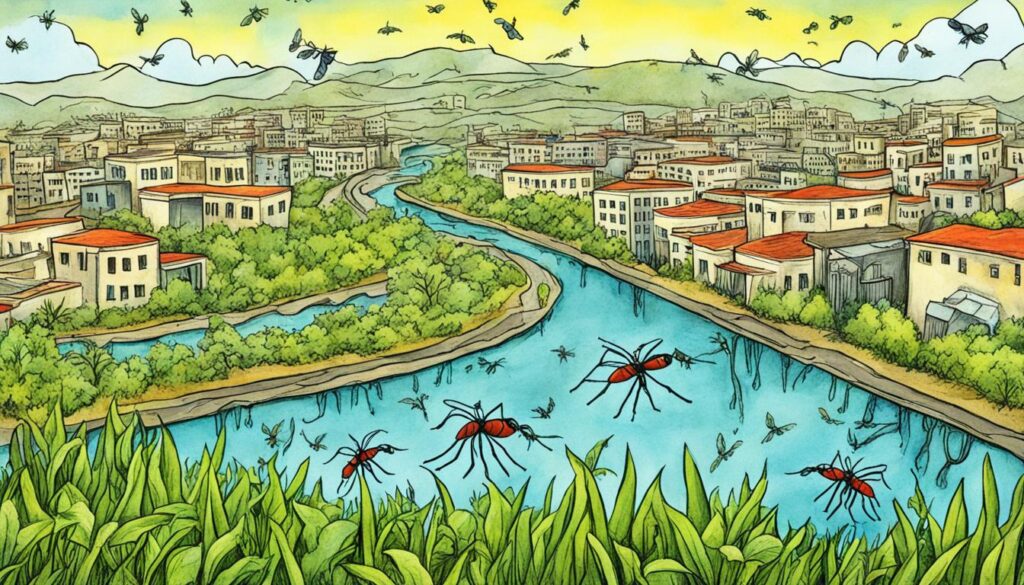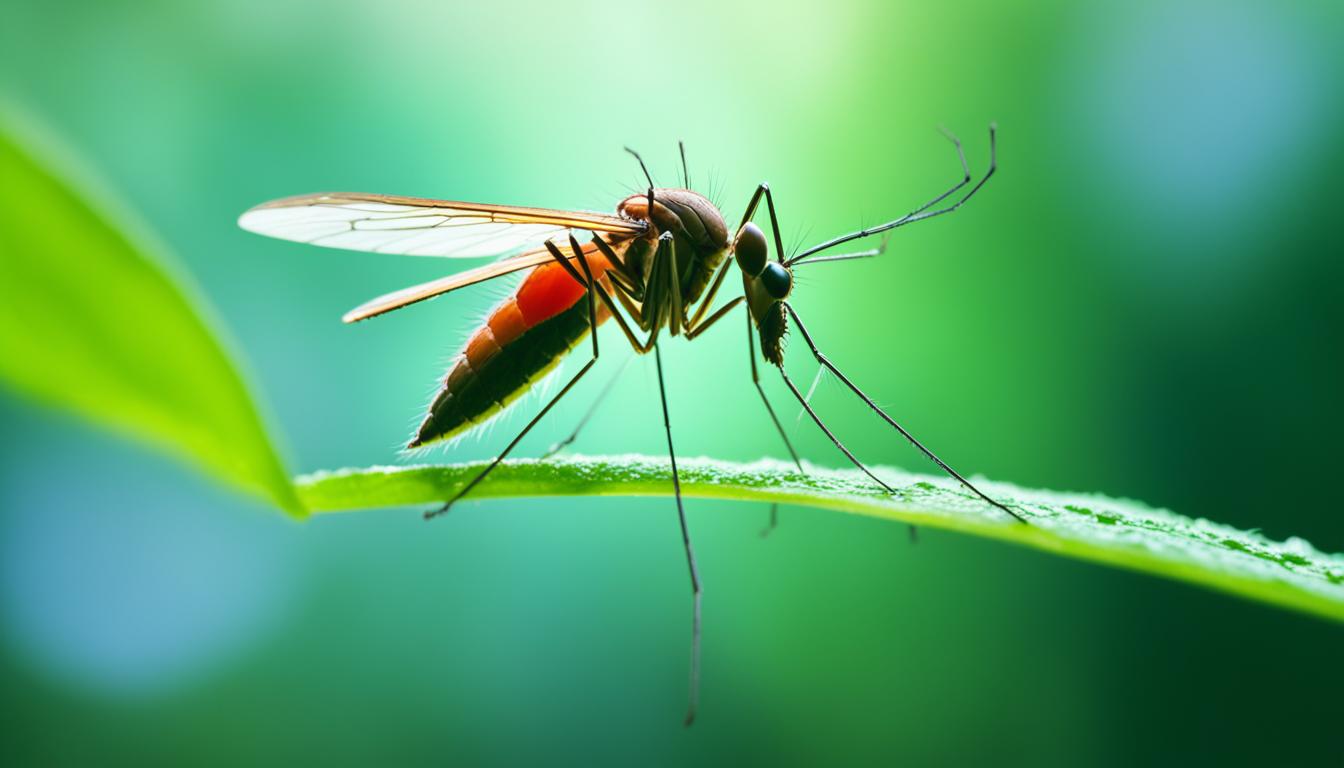Are There Mosquitoes in Addis Ababa
Welcome to our exploration of Addis Ababa, the vibrant and high-altitude capital of Ethiopia. Today, we dive into a question that may pique your curiosity: Are there mosquitoes in Addis Ababa?
When you think of mosquitoes, you might envision humid and tropical regions teeming with these pesky insects. But what about a city situated above 2,000 meters (6,500 feet)? Can mosquitoes thrive in the cool and mild climate of Addis Ababa?
- Addis Ababa, with its high altitude and dry climate, has no risk of malaria transmission due to the absence of malaria-carrying mosquitoes.
- While malaria may not be a concern, other mosquito species may exist in the city, posing minimal risk for transmitting diseases.
- Preventive measures, such as wearing protective clothing and using mosquito repellents, are still recommended to minimize mosquito bites.
- Construction sites and standing water can contribute to mosquito presence in Addis Ababa, particularly during the rainy season.
- Efforts to mitigate mosquito-borne diseases in Addis Ababa and other rapidly urbanizing areas in Africa are crucial for public health and well-being.
Malaria Risk and Prevention in Addis Ababa
In Addis Ababa, the risk of malaria transmission is considered low or nonexistent. This is because the city’s high altitude, dry climate, and absence of suitable breeding sites for malaria-carrying mosquitoes contribute to a low risk of malaria. The altitude of Addis Ababa, situated above 2,000 meters (6,500 feet), makes it inhospitable for these mosquitoes to survive.
However, it is always important to take appropriate precautions to prevent mosquito bites, especially if traveling outside of Addis Ababa to areas at lower altitudes where malaria transmission may occur. To protect yourself from mosquito bites, it is recommended to wear long-sleeved shirts, long pants, and use mosquito repellents containing DEET or picaridin. Additionally, sleeping under mosquito nets can provide an extra layer of protection, especially during the night when mosquitoes are most active.
Other Mosquito-Borne Diseases in Addis Ababa
While the risk of malaria transmission is low in Addis Ababa, it’s important to note that other mosquito-borne diseases may still be present in the city. These diseases include dengue fever and chikungunya, which are primarily transmitted by Aedes mosquitoes. The prevalence of these diseases in Addis Ababa is generally low, but it’s still advisable to take precautions against mosquito bites by using repellents and wearing protective clothing, especially during the rainy season when mosquito activity may be higher.
Factors Affecting Mosquito Presence in Addis Ababa

The presence of mosquitoes in Addis Ababa can be influenced by various factors. While malaria-carrying mosquitoes are not common in the city due to its high altitude, other mosquito species may still be present.
Factors that can contribute to mosquito presence in the city include:
- Construction sites
- Areas with standing water, such as small-scale water storage facilities and manmade pits
These locations can serve as breeding grounds for mosquitoes, particularly during the rainy season. To minimize mosquito populations, it’s important for local authorities to implement effective mosquito control measures in these areas.
To emphasize:
Construction sites and areas with standing water are key factors affecting mosquito presence in Addis Ababa.
Implementing rigorous mosquito control measures in these high-risk areas can help minimize the mosquito population and reduce the potential for mosquito-borne diseases.
Mitigation Strategies for Mosquitoes in Addis Ababa

To effectively mitigate the presence of mosquitoes in Addis Ababa, we need to focus on targeted strategies aimed at eliminating their breeding grounds and raising community awareness about mosquito-borne diseases. By implementing these mitigation strategies, we can reduce the risk of mosquito bites and protect the health of residents in Addis Ababa.
One of the key mitigation strategies involves identifying and eliminating areas where mosquitoes breed. Mosquitoes require standing water to lay their eggs and complete their life cycle. To disrupt their breeding, it is essential to remove sources of standing water in communities, construction sites, and public areas.
The use of larvicides is another effective measure to control mosquito populations. Treating potential breeding sites with larvicides prevents the hatching of mosquito eggs and reduces their numbers. Public health officials and local authorities should collaborate to ensure proper identification and treatment of mosquito breeding sites throughout Addis Ababa.
Community engagement plays a crucial role in mitigating the presence of mosquitoes. By raising awareness about mosquito-borne diseases and the importance of personal protective measures, such as using mosquito repellents and wearing protective clothing, we can empower individuals to protect themselves from mosquito bites. Public health campaigns and educational programs should be implemented to disseminate accurate information to residents in Addis Ababa.
Collaboration between public health officials, local communities, and construction sites is essential for the successful implementation of mitigation strategies. By working together, we can enforce mosquito control measures, identify and address potential breeding sites, and ensure the adherence to personal protective measures. This collaborative effort will contribute to a significant reduction in the mosquito population and the prevention of mosquito-borne diseases in Addis Ababa.
Urbanization and Mosquito-Borne Disease Risk in Africa
The rapid urbanization process in Africa, including cities like Addis Ababa, brings about new challenges in controlling mosquitoes and mitigating the risk of mosquito-borne diseases. As urban areas evolve, the introduction of invasive mosquito species, such as Anopheles stephensi, becomes a significant concern, as they thrive in urban environments and can increase the transmission of malaria. The growth of cities, construction booms, and changes in environmental conditions create favorable breeding grounds for mosquitoes, further exacerbating the risk.
This image illustrates the impact of urbanization on mosquito-borne disease risk in Africa.
Considering the growing urban population in Africa, it is crucial to implement effective mosquito control measures and public health interventions in rapidly urbanizing areas. These measures should focus on eliminating mosquito breeding sites, such as stagnant water sources in construction sites and in and around urban developments. By enhancing mosquito surveillance and implementing targeted interventions, we can prevent the spread of mosquito-borne diseases and protect the health of urban populations.
The expansion of urban areas brings about a range of environmental changes that facilitate mosquito breeding. These changes include the creation of artificial water bodies, inadequate waste management systems, and increased human-mosquito contact. Coupled with urbanization, these factors contribute to the emergence and spread of diseases like malaria, dengue fever, and chikungunya, posing significant health risks to urban communities.
Public health authorities and urban planners in Africa need to prioritize comprehensive strategies that integrate mosquito control measures into urban planning and development. This includes implementing sustainable drainage systems and promoting environmental management practices that minimize favorable mosquito breeding conditions. In addition, community engagement and public awareness campaigns about personal protective measures, such as using mosquito repellents and wearing protective clothing, are essential components of a holistic approach to reducing mosquito-borne disease risks in urban areas.
Impacts of Mosquito-Borne Diseases in Africa
Mosquito-borne diseases, including malaria, dengue fever, and chikungunya, have a significant impact on public health in Africa. These diseases can cause illness, disability, and even death, particularly in vulnerable populations such as children and pregnant women.
The economic burden of mosquito-borne diseases is also considerable, with costs associated with healthcare, treatment, and lost productivity. The healthcare systems in Africa bear the weight of providing necessary medical services, while the affected individuals and families deal with the physical, emotional, and financial consequences.
Efforts to prevent and control these diseases in Africa are critical to reducing the burden on healthcare systems and improving overall population health. This includes implementing comprehensive mosquito control measures, promoting public awareness about the importance of personal protective measures, and investing in healthcare infrastructure to diagnose and treat mosquito-borne diseases effectively.
It is not only the immediate impacts of mosquito-borne diseases that require attention, but also the long-term consequences. By addressing the root causes and implementing sustainable solutions, we can mitigate the impacts of these diseases on individuals, communities, and economies in Africa.
Conclusion
Addis Ababa, with its high altitude and dry climate, offers a low risk of malaria transmission. However, it’s important to be aware that other mosquito-borne diseases may still be present in the city, albeit at a low prevalence. To ensure the well-being of our community, it is crucial for both local authorities and individuals to take appropriate measures to prevent mosquito bites.
This is especially important during the rainy season or when traveling to areas at lower altitudes where malaria transmission is possible. By implementing effective mosquito control strategies and engaging the community in the fight against mosquito-borne diseases, we can significantly mitigate the risk in Addis Ababa and other rapidly urbanizing areas in Africa.
Together, through proactive public health interventions, we can safeguard the health of our residents and reduce the burden of mosquito-borne diseases. Let us remain vigilant and dedicated to protecting ourselves and our loved ones from the health risks associated with mosquitoes.




